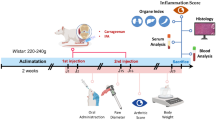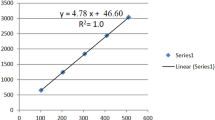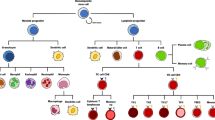Summary
To investigate the effect of curcumin on immune function of mice, the effect of curcumin was examined on the proliferation of spleen lymphocytes of mice and the function of phagocytosis of peritoneal macrophage by using MTT test and the expression of the nucleoprotein of NFκB p65 was determined in spleen lymphocytes by employing Western Blot. Our results showed that curcumin could enhance the phagocytosis of peritoneal macrophages. Lowdose curcumin could upregulate the proliferation of spleen lymphocytes of mice, and highdose curcumin could suppress the proliferation of spleen lymphocytes. Curcumin could suppress the expression of NFκB p65. Our study suggested that curcumin can regulate immune function of mice in a dosedependent manner. The possible underlying mechanism might be its ability to suppress the activity of NFκB p65.
Similar content being viewed by others
References
Pharmacopeia Committee of the People’s Republic of China eds. Pharmacopeia of the People’s Republic of China (Chinese). Beijing: Publishing Company of Chemistry and Industry, 2000, 218
Bian X Y, Yang M Y, Zhang Y. The application of improved MTT colorimetric assay to measured the proliferation of lymphocytes. J Jilin Med College (Chinese), 1997, 17(2):28
Zhao H, Gu D W, Zhang S Jet al. In vitro study of Biola Yedoensis Makino decoetion on regulating immunocyte functions in mice. J Fujian College TCM (Chinese), 2003, 13(2):27
Zhao H H. The effect of P substance on regulation of the function of murine peritoneal macrophages. J Immune China (Chinese), 1989, 5(2):75
Dignam J D, Lebovitz R M, Roeder R G. Accurate transcription initiation by RNA polymerase II in a solute extract from isolated mammaliannuclei. Nucleic Acid Res, 1983, 11:1475
Baeurele P A, Henkel T. Function and activation of NFκB in the immune system. Annu Rev Immunol, 1994, 12:141
Bielak Z A, Koronkiewicz M, Skierski Jet al. Effect of curcumin on the apoptosis of rodent and human non-proliferating and proliferating lymphoid cells. Nut Cancer, 2000, 38:131
Churchill M, Chadburn A, Bilinski R Tet al. Inhibition of intestinal tumors by curcumin is associated with changes in the intestinal immune cell profil. J Surg Res, 2000, 89(2):169
Ammon H P, Wahl M A. Pharmacology of Curcuma longa. Plant Med, 1991, 57:1
Gao X H, Jarret K, Jiang Het al. Immunomodulatory activity of curcumin: suppression of lymphocyte proliferation, development of cellmediated cytotoxicity, and cytokine production in vitro. Biochem Pharmacol, 2004, 68:51
Natrajan C, Bright J J. Curcumin inhibits experimental allergic encephalomyelitis by blocking IL12 signaling through januskinaseSTAT pathway in T lymphocytes. J Immunol, 2002, 169:6506
Bharti A C, Donato N, Singh Set al. Curcumin (difeuloylmethane) downregulates the constitutive activation of nuclear factor κB and IkBa kinase in human multiple myeloma cells, leading to suppression of proliferation and induction of apoptosis. Blood, 2003, 101:1053
Mukhopadyay A, Banerjee S, Stafford L Jet al. Curcumin induced suppression of cell proliferation correlates with downregulation of cyclin D1 expression and CDK4 mediated retnoblastoma protein phosphorylation. Oncogene, 2002, 21:8852
Singh S L, Aggarwal B B. Activation of transcription factor NFkB is suppressed by curcumin (diferuloylmethane). J Biol Chem, 1995, 270:24995
Wo X D, Qiu H X, Gao C Xet al. Toxicity of curcumin acting for long period. J Zhejiang College TCM (Chinese), 2000, 24(1):61
Cheng AL, Hsu C H, Lin J Ket al. Phase I clinical trial of curcumin, a hemopreventive agent, in patients with highrisk or premalignant lesions. Anticancer Res, 2001, 21(4B):2895
Author information
Authors and Affiliations
Additional information
LI Xinjian, male, born in 1969, M.D., Ph.D.
Rights and permissions
About this article
Cite this article
Xinjian, L., Xiaocheng, L. Effect of curcumin on immune function of mice. Current Medical Science 25, 137–140 (2005). https://doi.org/10.1007/BF02873559
Received:
Published:
Issue Date:
DOI: https://doi.org/10.1007/BF02873559




